Have you gotten an email that says ‘Hello, I am a representative of the HazardCC hacker group’. The email claims that from March to September, they gained access to your account by hacking your email provider and have recorded you visiting adult sites. It demands a payment in Bitcoin to prevent the distribution of these supposed recordings.
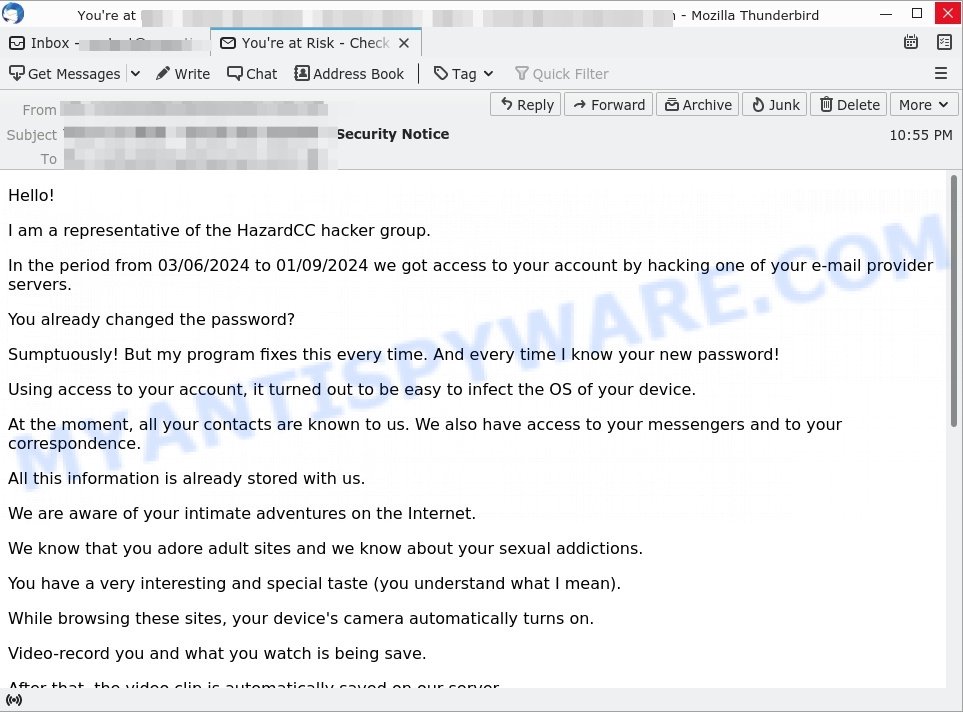
Question: Is it true that my system has been compromised, and do I need to pay them?
Investigation Findings: This type of email is a classic example of a “sextortion scam“. Scammers do not have access to your device or any real compromising material. These threats are designed to create fear and pressure you into making a payment. It’s worth noting that several years ago, we reported on a similar scam where the email started with “I am a representative of the ChaosCC hacker group“. It appears the scammers have slightly modified the text and reinitiated the campaign.
Answer: The ‘I am a representative of the HazardCC hacker group’ email is a fraudulent scam. 💡 To safeguard yourself from these scams, do not respond to the emails or make any payments. Update your antivirus software and consider performing a comprehensive scan on your system. Changing your email and device passwords can also improve your security.
Table of Contents
🚨 Is the ‘I am a representative of the HazardCC hacker group’ Email a Scam?
Yes, the email claiming that you are being targeted by the HazardCC hacker group, threatening to release compromising videos unless you pay in Bitcoin, is indeed a scam. 🚫 If you’ve received such an email, exercise extreme caution. The claims are fabricated and designed to instill urgency, misleading you into paying money to the scammer.
A typical “I am a representative of the HazardCC hacker group” scam email reads as follows:
Hello!
I am a representative of the HazardCC hacker group.
In the period from 03/06/2024 to 01/09/2024 we got access to your account by hacking one of your e-mail provider servers.
You already changed the password?
Sumptuously! But my program fixes this every time. And every time I know your new password!
Using access to your account, it turned out to be easy to infect the OS of your device.
At the moment, all your contacts are known to us. We also have access to your messengers and to your correspondence.
All this information is already stored with us.
We are aware of your intimate adventures on the Internet.
We know that you adore adult sites and we know about your sexual addictions.
You have a very interesting and special taste (you understand what I mean).
While browsing these sites, your device’s camera automatically turns on.
Video-record you and what you watch is being save.
After that, the video clip is automatically saved on our server.
At the moment, several analogy video records have been collected.
From the moment you read this letter, after 60 hours, all your contacts on this email box and in your instant messengers will receive these clips and files with your correspondence.
If you do not want this, transfer 1300 USD to the following address on βitcoin:1MJQ71oStdEmK7wh7chhAigfF17oFUrMaD
I guarantee that we will then destroy all your secrets!
As soon as the money is in our account – your data will be immediately destroyed!
If no money arrives, files with video and correspondence will be sent to all your contacts.
You decide… Pay or live in hell out of shame…
We believe that this whole story will teach you how to use gadgets properly!
Everyone loves adult sites, you’re just out of luck.
For the future – just cover a sticker your device’s camera when you visit adult sites!
Take care of yourself!
This scam involves fraudsters sending emails that claim they have compromised your privacy, suggesting that they have access to your device and have recorded compromising footage of you. The scammers demand a ransom in Bitcoin to prevent the release of this alleged footage.
However, legitimate cybersecurity experts and organizations confirm that these claims are baseless. No actual access or recording has occurred; the email is designed to scare you into paying the ransom. Scammers often send these emails in bulk, hoping to catch unsuspecting victims.
The alarming spread of these scams has prompted various government and consumer protection agencies, including the FBI and the Better Business Bureau, to issue warnings. These agencies have reported that these scams have been widespread, using similar tactics to exploit individuals’ fears of privacy invasion and public embarrassment.
The fraudulent emails often claim they have observed your online behavior and threaten to share embarrassing footage unless you pay. They provide a Bitcoin wallet address for the payment and set a deadline to increase the urgency and pressure.
🚩 Red Flags to Watch Out For:
To protect yourself, be aware of these warning signs of the scam: 🔍🛡️
- 📧 Threats: Unexpected emails that claim someone has hacked your account and demand payment to prevent the release of compromising videos.
- 💸 Ransom Demands: The scam includes demands for payment in Bitcoin, claiming it is the only way to prevent the release of the alleged footage.
- ⏳ Urgency and Imposed Deadlines: These emails impose a tight deadline to pressure you into acting hastily, using fear of embarrassment or reputational damage to coerce you into paying immediately.
- 🔄 No Evidence of Compromise: The email provides no real evidence that any actual observation or recording has taken place.
- 👤 Anonymity of the Sender: Scammers use anonymous email addresses and provide untraceable Bitcoin wallet addresses, making it difficult to verify the source.
- 🔗 Suspicious Claims: Be skeptical of any email that makes extraordinary claims about hacking your account and demands for money.
💡 Never respond to such emails or send money. Additionally, ensure your antivirus software is up to date. If you are concerned, run a virus scan on your device and change your email passwords for safety.
Understanding the ‘I am a representative of the HazardCC hacker group’ Email Scam
If you receive an email claiming, “I am a representative of the HazardCC hacker group“, it’s understandable to feel alarmed 🚨. These emails start with bold assertions meant to capture your attention and create immediate anxiety. You might ask yourself, How did they get access to my account? In truth, the sender likely hasn’t accessed your device; their goal is to incite fear to provoke a hasty decision.
These emails contain unfounded threats, alleging they’ve recorded you during private moments 🎥 and claiming to have infected your OS, gained access to your contacts, and messengers. The language is designed to unsettle you and induce shame, pushing you to think, Could this actually be real?
The scammer claims to continuously obtain your new passwords and has installed malware on your device, supposedly giving them control over your camera and stored information 💻. However, a major sign that this is a scam is the complete absence of any genuine proof 🚩. They rely on your fear and embarrassment to coerce you, not on actual technical capabilities.
The email concludes with a ransom demand 💰, requesting payment in Bitcoin to ensure the sender remains anonymous. This scheme pressures you to pay quickly, under the threat of distributing the alleged recordings and your private correspondence to your contacts. Yet, paying does not guarantee your privacy and could potentially mark you for further scams.
Upon receiving the email, you might question, Am I truly at risk? or Can this person actually do what they claim? Generally, these threats are entirely fabricated; they exploit your fears without any real basis.
What should you do? It’s crucial not to respond to the scammer or send any money. Instead, focus on enhancing your online security: update your passwords, ensure your devices are secure, and consider reporting the incident to authorities if the scam involves threats or extortion 🔐. Such incidents highlight the importance of being vigilant and maintaining robust online security practices.
This scam leverages fear and urgency to deceive you. If you receive an email like this, do not interact with the scammer or transfer any money. Simply delete the email. Also, safeguard your computer with updated anti-virus software, and use strong, unique passwords for all your accounts to help prevent falling victim to such scams.
Examples of such scams
Scammers have developed a variety of tactics to intimidate and exploit unsuspecting individuals. Here are a few common examples:
💼 I am a professional hacker EMAIL SCAM
Posing as a hacker, the sender of this email might say they’ve infiltrated your system. They may even claim they have proof of embarrassing activity and will publish it unless you send them money. Remember, a real hacker wouldn’t announce their presence—it’s a tactic to pressure you into paying.
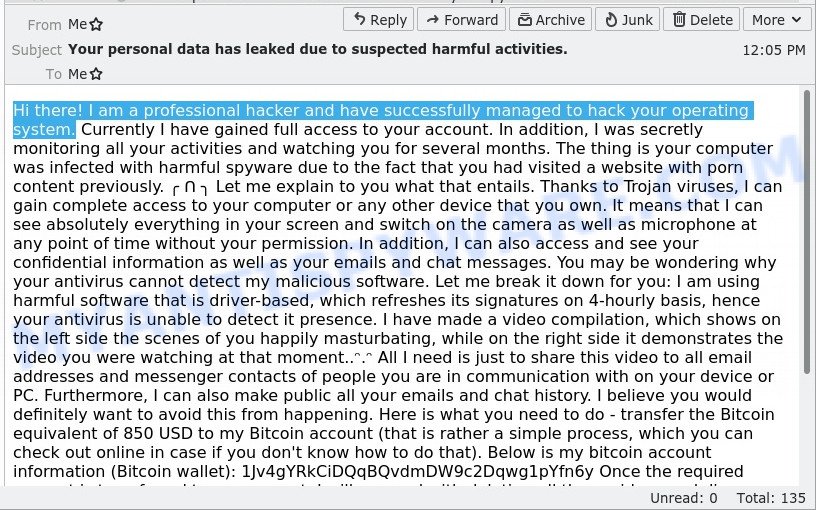
🔒 Your Private Information has been Stolen Email Scam
Here, the scammer will claim they’ve stolen sensitive information from you and threaten to release it unless you pay a ransom. They rely on the scare factor, hoping you’ll pay to protect your reputation, even though they likely have no data at all.
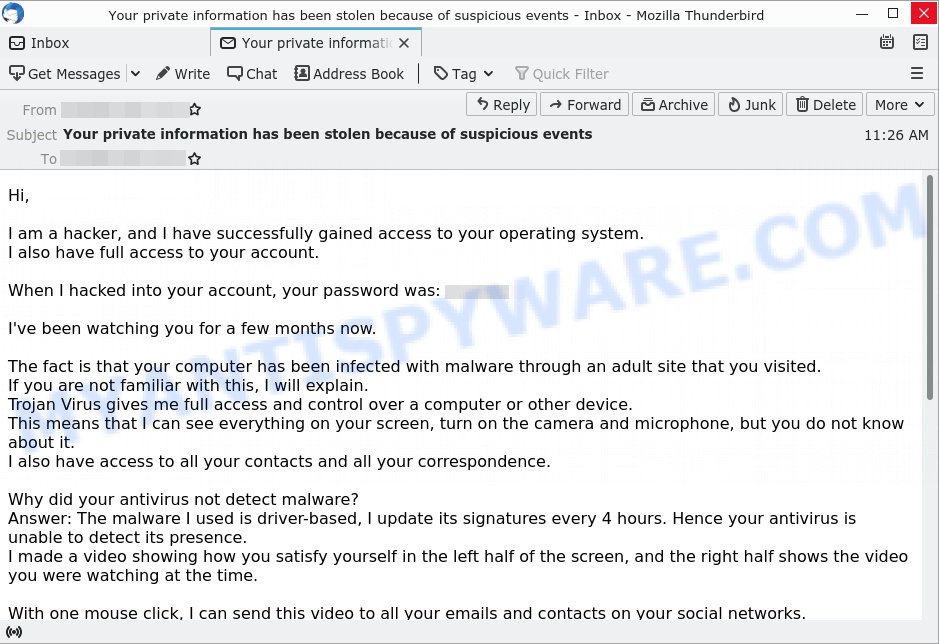
📹 I RECORDED YOU Email Scam
In this scam, the sender claims to have control over your camera and alleges they have recorded you during private moments. They typically demand payment to keep the footage private. Beware: this is a bluff to get you to pay up out of fear.
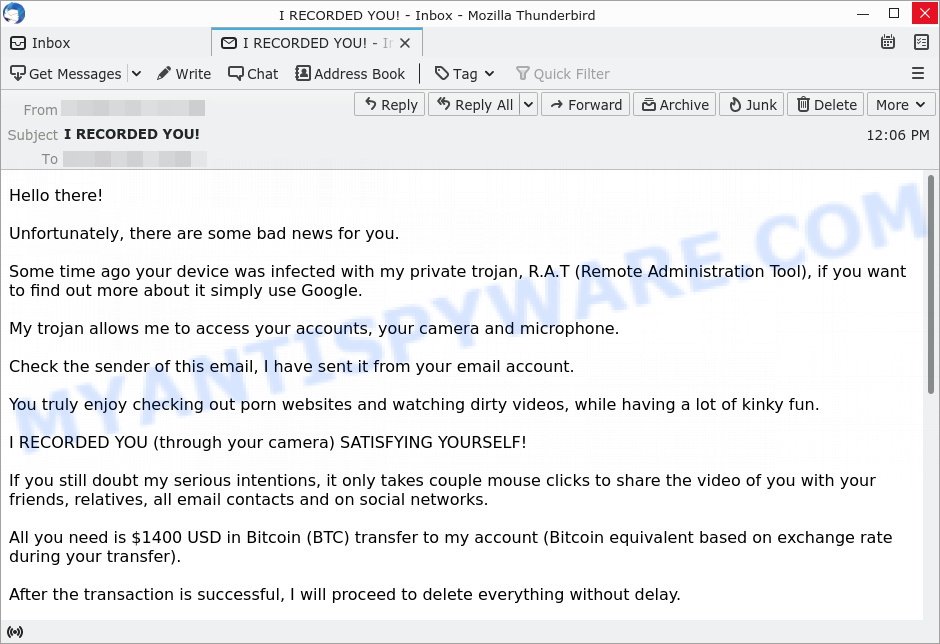
Each of these scams plays on fear and urgency to trick you into acting against your best interest. Always approach such emails with skepticism, verify your security, and do not engage with the scammers.
Should you send the money?
No, don’t give the scammer any money. It’s a scam, and giving them money will only encourage them to continue their criminal activities. Plus, if you pay once, they might target you again. To keep your personal information safe, always use strong and unique passwords for each of your accounts, enable two-factor authentication for an extra layer of security, and keep your computer’s antivirus software up to date. If you receive an email like this, it’s important to report it to the authorities and your email provider.
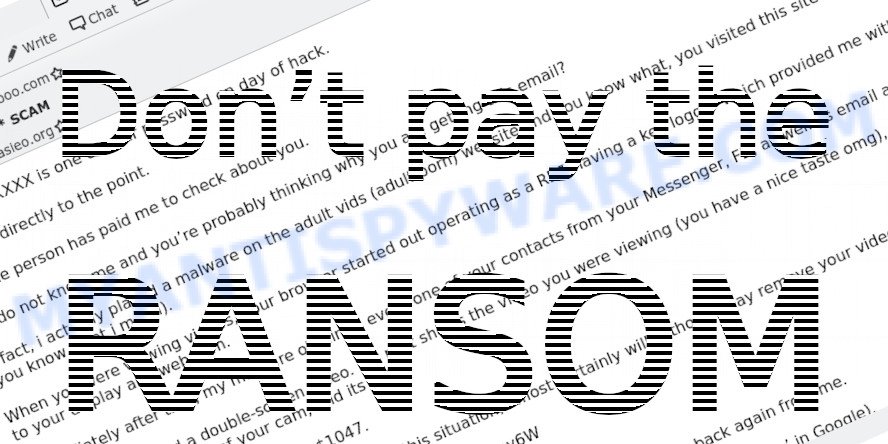
What to Do if You Get This Scam Email
Getting an email that says someone hacked your devices and has compromising information can be scary, but there are easy and safe ways to handle it.

Here’s what to do:
First, stay calm. The email is meant to scare you and make you act without thinking. Remember, it’s just a scam to make you feel afraid.
Don’t pay them. Paying won’t make the problem go away. It only shows the scammer that you are an easy target for future scams.
Don’t reply to the scammer. Responding can give them more information about you and confirm that your email is active, which could lead to more scams.
If the email mentions a password you recognize, check where it came from. Use sites like haveibeenpwned.com to see if your email or passwords have been part of a data breach.
Then, change your passwords. Use strong, unique passwords and set up two-factor authentication where you can.
For safety, run a full security scan on your device. The email’s claims about malware are usually false, but it’s good to make sure your system is clean.
Report the email to the authorities (like the FTC). Reporting helps with investigations and can stop these scams from happening to others.
Finally, tell others. Let your friends, family, and coworkers know about this scam so they can avoid it too. Sharing this information makes everyone safer.
Threat Summary
| Name | I am a representative of the HazardCC hacker group Email Scam |
| Type | Sextortion/Scareware |
| Ransom Amount | You’re at Risk – Check this out – Security Notice |
| Email Subject | $1300 in Bitcoin |
| Bitcoin Address | 1MJQ71oStdEmK7wh7chhAigfF17oFUrMaD |
| Fake Claims | Claims of having accessed the recipient’s account by hacking their email provider, infecting their device’s operating system, and recording them through their device’s camera while visiting adult websites, with threats to distribute the recordings to contacts |
| Damage | Psychological distress, potential financial loss if ransom is paid, privacy invasion |
| Distribution | Email campaigns with shock-inducing, personalized threats claiming remote access to accounts and devices |
| Tactics | Inducing fear by claiming continuous access to new passwords, making accusations related to personal activities on adult sites, and creating urgency with a 60-hour payment deadline |
| Variations | Different ransom demands, varying narrative details, various impersonated hacker group identities |
| Prevention Tips | Do not engage or respond; enable two-factor authentication; use strong, unique passwords; cover webcams when not in use; keep devices secure with updated antivirus software; report the scam |
| Reporting Info | Forward to the Anti-Phishing Working Group at reportphishing@apwg.org; Report to Internet Crime Complaint Center (IC3) if in the US; Inform friends and family to raise awareness; Monitor accounts for suspicious activity |
Conclusion
The “I am a representative of the HazardCC hacker group” email is a type of sextortion scam that leverages fear to extort money from you. The scammer falsely claims to have hacked your devices and obtained access to your accounts, allegedly recording you visiting adult websites. They threaten to distribute these fabricated recordings to your contacts unless you pay them in Bitcoin. Keep in mind, these threats are fabricated and designed to intimidate you into paying.
Bottom Line: Disregard these emails. The most effective defense is to avoid engaging with the sender and ensure your devices are well-protected. 🛡️💻
Stay vigilant and trust your instincts; any email that induces fear or comes across as overly aggressive is likely a scam. 🤔

















